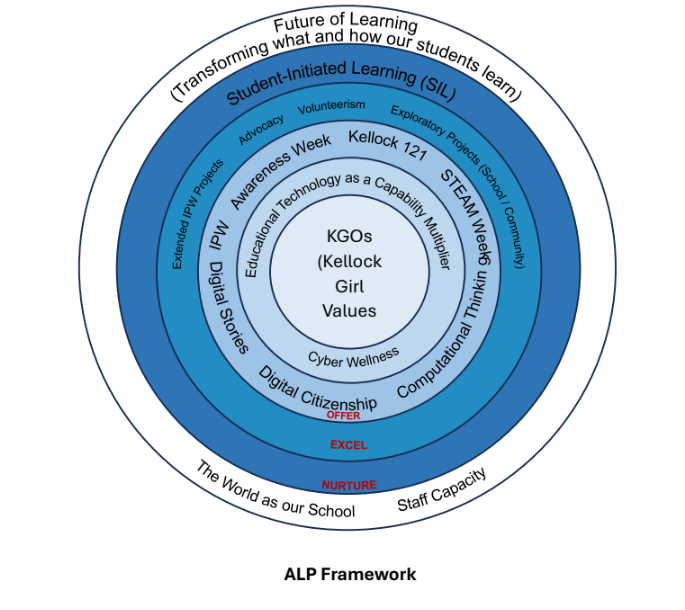Applied Learning Programme
Applied Learning Programme (ALP) - Future-Ready K-Champs
The Applied Learning Programme (ALP) embodies the school’s aspirations and directions to realise the school’s vision of “A Christ-centred and future-oriented learning community where every child will develop her unique giftedness to learn and lead, for others”, which is also aligned to the mandate of the IJ mission. The Kellock Girl Outcomes (KGOs) are nurtured and developed in all our students through their curriculum and co-curriculum experiences.
Introduced in 2019-2020, the ALP was reviewed in 2021-2022 and further reviewed in 2024 to take stock and further align its focus area, objectives and outcomes to emerging needs, to make shifts to prepare our fraternity / staff and our students for the Future of Learning (FoL) . With the accelerating pace of technological advancement, political and economic changes in global economies, demographic shifts and the changing fabric of society, our students will need to be future-ready and equipped with competencies to thrive beyond school.
In 2021, Educational Technology (Ed Tech) was intentionally identified and prioritised as a strategic enabler in teaching and learning to achieve Kellock’s intended student outcomes, the Kellock Girl Outcomes. Ed Tech enables more efficient and effective teaching and learning of content subjects, and other student learning experiences which directly support the development of 21CC. Since then, the school has been charting its educational technology journey for its staff, aligned to the STP and the SFED, and more recently to the Ed Tech Masterplan 2030, to enhance staff competencies to realise our vision. Ed Tech practices are integrated in the curriculum and digital and technical literacies2 continue to be developed and honed in staff and students. The ALP focus area has thus shifted to Educational Technology to underpin the students’ learning experiences in tandem with the FoL imperative and preparing our students to be Future-Ready K-Champs.

Since 2021, the school has leveraged the SLS Pedagogical Scaffold (now, Ed Tech Pedagogical Scaffold) to design and implement enriching lessons with technology through the professional learning teams at all levels and for all subjects. Students acquire 21 CC competencies through the Kellock One-to-One programme where the Ed Tech Pedagogical Scaffold is enacted in the classroom as aligned to the STP, as part of our school-wide emphasis on and adoption of e-pedagogy, to realise the Kellock Girl Outcomes. P1-6 girls are exposed to Computational Thinking and Digital Citizenship Programmes as part of the Kellock Experience, and P1-2 girls have customised Computational Thinking, Digital Stories and Digital Citizenship Programmes during the White Space Curriculum. Students engage in game-based challenges during STEAM week to pique their interest and curiosity in innovation and future-technologies for learning and sustainability efforts, while Awareness Day provides exposure to real-world issues and concerns. Interdisciplinary Project Work (IPW) provides a platform to enable all students to be intentional about solving multi-faceted problems by adopting an interdisciplinary perspective and approach to sharpen and develop attributes of the KGOs, such as Critical and Creative Thinking, Communication skills, Reflective Learning, Leading by Example, Putting Others before Self and Collaborating with Others.
Design Features
With Educational Technology (Ed Tech) as the strategic enabler, the ALP is designed to be progressive, and offers a range of age-appropriate developmental opportunities for all students. It aims to enable our learners with the knowledge, skills, dispositions and values that would help our learners be confident, critical and responsible users of digital technologies, within the context of authentic learning and application in the real world.
The progressive learning and application of Ed Tech knowledge and competencies to bridge knowledge and real-life application for students is anchored on the KGOs, where students participate in programmes such as Digital Stories (P1-P2), Computational Thinking (P1-P6), IPW (P3-P5) and Digital Citizenship (P1-P6). The learning will enhance students’ thinking and ability to apply the relevant skill sets in any situation, e.g., environmental concerns or social and community issues.
The P3, P4 and P5 specially designed Project Work comprises interdisciplinary links among subjects such as English, Math, Science and Art. These interdisciplinary links are applied when students draw on their learning from different subjects to understand, empathise, unpack, articulate or define issues / problems associated with the topic of the Project Work and when students apply what they have learnt in different subjects to ideate and / or create solutions to the problems. This process is implemented using the STEM Quartet approach.
The ALP also leverages established partnerships with a range of agencies and stakeholders through the school’s IPW efforts over the last few years to enrich students’ learning. The school is also re-imagining its physical spaces to further leverage and optimise its learning environment for authentic learning to complement the delivery of the ALP.

